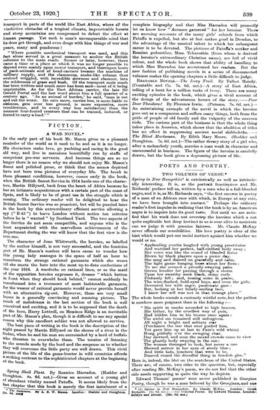FICTION.
A WAR NOVEL.* Ix the early part of his book Mr. Mason gives us a pleasant reminder of the world as it used to be and as it is no longer. His characters make love, go yachting and racing in the good old way, and live in mansions beautifully run by staffs of competent pre-war servants. And because things are so no longer there is no reason why we should not enjoy Mr. Mason's fluent and polished prose, or think that the scenes depicted have not been true pictures of everyday life. The break in these pleasant conditions, however, comes early in the book, when the British Secret Service in 1914 hauls one of the charac- ters, Martin Hillyard, back from the heart of Africa because he has an intimate acquaintance with a certain part of the coast of Spain, and is likely to be of great use in the struggle which is coming. The ordinary reader will be delighted to hear the British Secret Service was so prescient, but will be puzzled later in the book by this extraordinary efficient service allowing a spy (" B 45 ") to leave London without notice ton minutes before he is " wanted " by Scotland Yard. The two aspects of the Service do not seem compatible, and anyone who is the least acquainted with the marvellous achievements of the Department during the war will know that the first view is the true one.
The character of Joan Whitworth, the heroine, so labelled by the author himself, is not very successful, and the feminine part of Mr. Mason's readers will have cause to wonder how this young lady manages in the space of half an hour to transform the strange rational garments which she wears till she meets the hero into the most up-to-date confections of the year 1916. A wardrobe on rational lines, or as the maid of the opposition heroine expresses it, dresses " which button in front when they should hook behind," cannot suddenly be transformed into a trousseau of most fashionable garments, for the wearer of rational garments would never provide herself with an alternative rig-out. However, these are very small lapses in a generally convincing and amusing picture. The touch of melodrama in the last section of the book is well conceived and exciting, and it is to be supposed that the death of the hero, Harry Luttrell, on Messines Ridge is an inevitable part of Mr. Mason's plan, though it is difficult to see any special reason why this excellent soldier was not allowed to survive.
The best piece of writing in the book is the description of the night passed by Martin Hlllyard on the shores of a river in the Sudan, when he and his men are surrounded by a herd of buffalo who threaten to overwhelm them. The tension of listening to the sounds made by the herd and the suspense as to whether they will overcome the little party are well drawn. This vivid picture of the life of the game-hunter in wild countries affords a striking contrast to the sophisticated chapters at the beginning of the book.


































 Previous page
Previous page